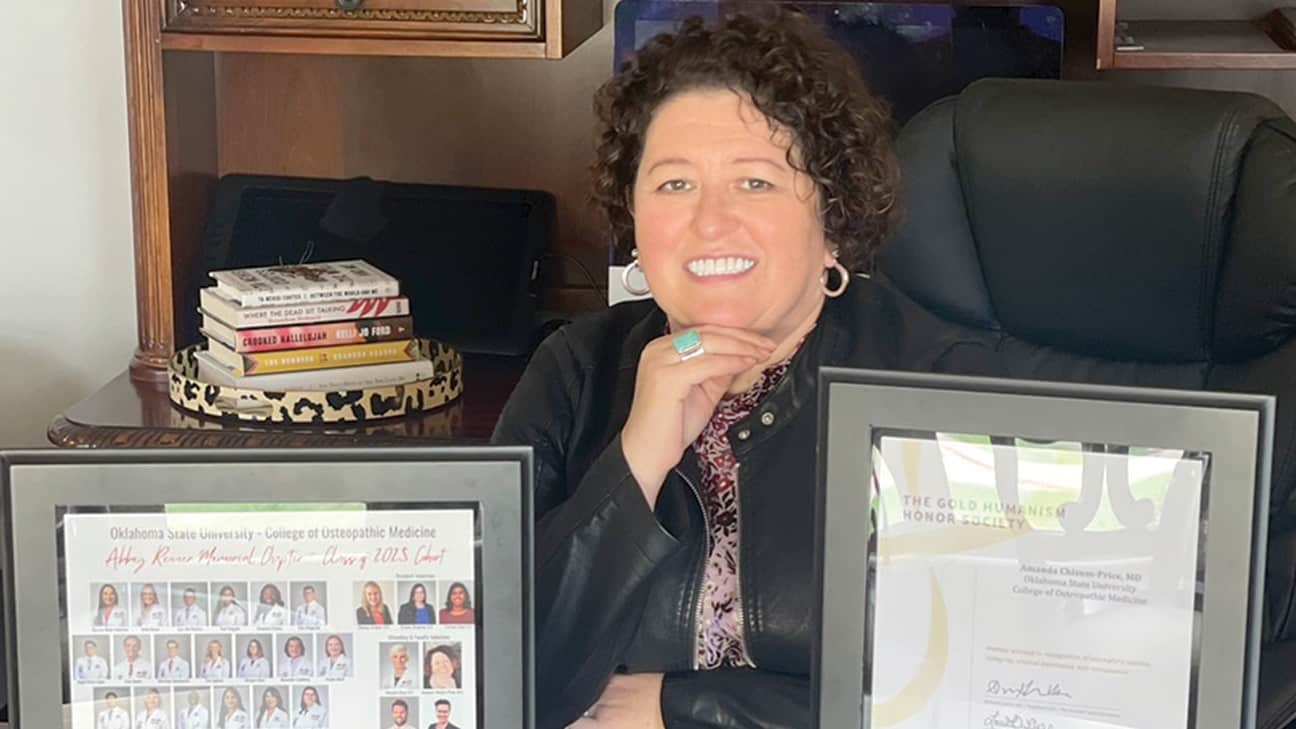
Dr. Chisum-Price was awarded the National Indian Health Board’s Area Impact Award and the Gold Humanism Honor Society Award.
Tribal member, doctor receives national recognition for her work
Published November 1, 2023By Chris Jennings
Dr. Amanda Chisum-Price is bringing national exposure to the Choctaw Nation in the form of several recognitions she has recently received.
Dr. Chisum-Price was awarded the National Indian Health Board‘s Area Impact Award for outstanding service to advance American Indian and Alaska Native health. She was also nominated by her medical students from the OSU College of Osteopathic Medicine for the Gold Humanism Honor Society Award (GHHS), which recognizes physicians for practicing patient-centered medical care by modeling the qualities of integrity, excellence, compassion, altruism, respect, and empathy.
Dr. Chisum-Price is also the first federal appointment as a National Delegate to the Department of Health and Human Services Office of Minority Health Center for Indigenous Innovation and Health Equity Tribal Advisory Committee (DHS CIIHE TAC).
Serving as a perfect example of Servant Leadership, Dr. Chisum-Price is quick to point out that this recognition is only possible with the people she works with.
Dr. Chisum-Price said the Area Impact Award was largely based on their work with the breast center. One of the things that makes the breast center stand out is its approach to treating patients. “We try to take more of what would be equivocal to a medicine wheel approach where we’re trying to treat the entire patient,” said Dr. Chisum-Price.
There needs to be more than just the physical aspect, said Dr. Chisum-Price. “We’ve built in programs that fit within our health system. They do come to see us here for their medical care. Still, while they’re here, we also have built-in an Integrative Behavioral Health program so that they can get some level of counseling at the same time they’re here for their visits,” said Dr. Chisum-Price.
The Breast Center has also teamed up with the Wellness Center with a 12-week program the Wellness Center does with diabetes patients. “They kind of piggyback together, but it’s a 12-week wellness program that the patients go through when they’re in their survivorship phase of their treatment where they’ll get nutrition counseling, learn about exercise, mindfulness and work one-on-one with a trainer over that period of 12 weeks,” Dr. Chisum-Price said.
The Breast Center’s success is likely one reason Chief Gary Batton nominated her to serve on the DHS CIIHE TAC. By serving on the committee, which is made up of mostly tribal leadership, Dr. Chisum-Price can bring a surgeon’s perspective to an area that could have a national impact on Native health through the recommendations they make to DHS.
“We work with the Department of Health and Human Services through a mandate from President Biden to try to develop new ways to focus on and address health equity issues within our communities. It’s an onerous task, but it has been a really good experience,” said Dr. Chisum-Price.
Dr. Chisum-Price’s dedication to her patients, the Breast Center and her willingness to serve as a national delegate demonstrate her care and compassion. Both are required to receive the Gold Humanism Honor Society Award.
GHHS is a community of medical students, physicians, and other leaders recognized for their compassionate care. GHHS reinforces and supports the human connection in healthcare, which is essential for the health of patients and clinicians.
“The criteria bring a human approach to health care. I think it really fits in with the rest of it, but just to treat patients in a warm, concerned manner of caring individualized for each patient,” said Dr. Chisum-Price. “It was a huge honor to me, and the fact that the students had nominated me for that made it even more special because they’re with you 24/7 when they’re down here, so they see you at the best and the worst.”
Dr. Chisum-Price and her staff set some goals when she first came to the Nation 12 years ago, and these recognitions are signs that she and her team are accomplishing those goals.
“We’re accomplishing enough things as a group that it’s catching some attention and, hopefully, improving health care in the area, which is our overall big goal,” said Dr. Chisum-Price.
They’re not done yet; there are more things they want to get done. She says they want to focus more on training. And trying to get more help to junior high and high school students interested in a science or health-based field and then trying to get them to stay in the area.
“To me, it’s important to get people to our area to want to stay here and take care of our patient’s long term. I think we have had some success with the residency program that has changed the composition in a very positive way here at the hospital,” Dr. Chisum-Price said.
One of the things Dr. Chisum-Price says is better in the turnover rate in primary care. She said they have doctors who want to stay and treat their patients. The patients can appreciate this, too.
As a Choctaw doctor at the Choctaw hospital treating Choctaw patients, Dr. Chisum-Price says her patients can sense a cultural connection with her.
This idea goes back to her medicine wheel treatment approach. Treating the patient as a whole, including a better cultural understanding, has a deeper impact on their health and wellness, making for a healthier and stronger Choctaw Nation.